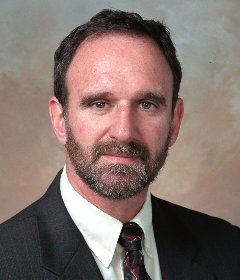
Ralph C. Merkle is a computer scientist. He is one of the inventors of public-key cryptography, the inventor of cryptographic hashing, and more recently a researcher and speaker on cryonics.

Adi Shamir is an Israeli cryptographer. He is a co-inventor of the Rivest–Shamir–Adleman (RSA) algorithm, a co-inventor of the Feige–Fiat–Shamir identification scheme, one of the inventors of differential cryptanalysis and has made numerous contributions to the fields of cryptography and computer science.

Martin Edward Hellman is an American cryptologist, best known for his involvement with public key cryptography in cooperation with Whitfield Diffie and Ralph Merkle. Hellman is a longtime contributor to the computer privacy debate, and has applied risk analysis to a potential failure of nuclear deterrence.

Van Jacobson is an American computer scientist, renowned for his work on TCP/IP network performance and scaling. He is one of the primary contributors to the TCP/IP protocol stack—the technological foundation of today’s Internet. Since 2013, Jacobson is an adjunct professor at the University of California, Los Angeles (UCLA) working on Named Data Networking.
The IEEE Richard W. Hamming Medal is presented annually to up to three persons, for outstanding achievements in information sciences, information systems and information technology. The recipients receive a gold medal, together with a replica in bronze, a certificate and an honorarium.

The IEEE Alexander Graham Bell Medal is an award honoring "exceptional contributions to communications and networking sciences and engineering" in the field of telecommunications. The medal is one of the highest honors awarded by the Institute of Electrical and Electronics Engineers (IEEE) for achievements in telecommunication sciences and engineering.
Alexander G. Fraser, also known as A. G. Fraser and Sandy Fraser, is a noted British-American computer scientist.
John Sullivan Mayo is an American engineer, AT&T executive and seventh president of Bell Labs, known from contributions to the computer and telecommunications industry.
The IEEE Eric E. Sumner Award is a Technical Field Award of the IEEE. It was established by the IEEE board of directors in 1995. It may be presented annually, to an individual or a team of not more than three people, for outstanding contributions to communications technology. It is named in honor of Eric E. Sumner, 1991 IEEE President.
The IEEE Founders Medal is an award is presented for outstanding contributions in the leadership, planning, and administration of affairs of great value to the electrical and electronics engineering profession. It may be presented to an individual or team up to three in number. This medal was established by the Institute of Radio Engineers (IRE) in 1952. The medal continued to be awarded after the merge of the IRE with the American Institute of Electrical Engineers (AIEE) in 1963 to form the IEEE. Recipients of this medal receive a gold medal, bronze replica, certificate, and cash honorarium.
The IEEE Jack S. Kilby Signal Processing Medal is presented "for outstanding achievements in signal processing" theory, technology or commerce. The recipients of this award will receive a gold medal, together with a replica in bronze, a certificate and an honorarium.
The IEEE Herman Halperin Electric Transmission and Distribution Award is a Technical Field Award of the IEEE that is presented for outstanding contributions to electric transmission and distribution. The award may be presented annually to an individual or a team of up to three people. It was instituted by the IEEE Board of Directors in 1986.
The IEEE Frederik Philips Award is a Technical Field Award that was established by the IEEE in 1971. The award is presented for outstanding accomplishments in the management of research and development resulting in effective innovation in the electrical and electronics industry. This award may be presented to an individual or team of up to three people. Recipients of this award receive a bronze medal, certificate, and honorarium.
The IEEE Richard M. Emberson Award was established by the IEEE Board of Directors in 1986. It is presented to an IEEE member for distinguished service to the development, viability, advancement, and pursuit of the technical objectives of the IEEE.
Hisashi Kobayashi is the Sherman Fairchild University Professor of Electrical Engineering and Computer Science, Emeritus at Princeton University in Princeton, New Jersey. His fields of expertise include applied probability; queueing theory; system modeling and performance analysis; digital communication and networks; network architecture; investigation of the Riemann hypothesis; and stochastic modeling of an infectious disease. He was a Senior Distinguished Researcher at the National Institute of Information and Communications Technology (NICT), Japan from September 2008 to March 2016.

John Mathew Cioffi is an American electrical engineer, educator and inventor who has made contributions in telecommunication system theory, specifically in coding theory and information theory. Best known as "the father of DSL," Cioffi's pioneering research was instrumental in making digital subscriber line (DSL) technology practical and has led to over 400 publications and more than 100 pending or issued patents, many of which are licensed.
Thomas E. Anderson is an American computer scientist noted for his research on distributed computing, networking and operating systems.
Jean Camille Walrand is a professor of Computer Science at UC Berkeley. He received his Ph.D. from the Department of Electrical Engineering and Computer Sciences department at the University of California, Berkeley, and has been on the faculty of that department since 1982. He is the author of "An Introduction to Queueing Networks", "Communication Networks: A First Course", "Probability in Electrical Engineering and Computer Sciences: An Application-Driven Course", and "Uncertainty: A User Guide", and co-author of "High-Performance Communication Networks", "Communication Networks: A Concise Introduction", "Scheduling and Congestion Control for Communication and Processing networks", and "Sharing Network Resources". His research interests include stochastic processes, queuing theory, communication networks, game theory, and the economics of the Internet.
Rüdiger Leo Urbanke is an Austrian computer scientist and professor at the Ecole polytechnique fédérale de Lausanne (EPFL).
Muriel Médard is an information theorist and electrical engineer. She is the Cecil H. Green Professor of Electrical Engineering at the Massachusetts Institute of Technology (MIT) and is known for her research in network coding.





